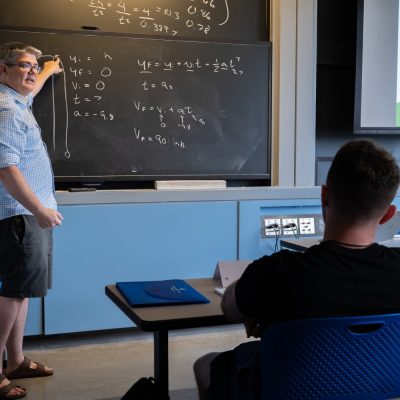
Two from AeroAstro named among 2023 IAF Emerging Space Leaders
Madelyn Hoying and Shravan Hariharan are among the students and young professionals selected by the IAF Emerging Space Leaders Sub-Committee.
PhD student Madelyn Hoying (Human Systems Lab) and Shravan Hariharan (S.M. ’23) have been named Emerging Space Leaders by the International Astronautical Federation. Part of this award includes sponsorship for attendance at the Space Generation Congress (September 28-30) and the 74th International Astronautical Congress (October 2-6) in Baku, Azerbaijan.

Madelyn Hoying is pursuing a Ph.D. in the joint MIT and Harvard Medical School Medical Engineering and Medical Physics program, and an M.S. in AeroAstro at MIT. Her Ph.D. research in the Tearney Lab at Massachusetts General Hospital investigates aerospace physiology leading to novel medical devices for long-duration spaceflight. Her M.S. research in the Aerospace Physiology Laboratory at MIT targets changes to neurological systems in spaceflight. Madelyn graduated from Duquesne University in 2020 with a B.S. in Biomedical Engineering and a B.A. in Physics, where she was a 2020 nominee for the NCAA Woman of the Year Award.
In addition, Madelyn designs and leads analog missions to test new technologies, human operations, crew dynamics, and recovery procedures in simulated planetary surface exploration missions. Analog research is one of her priorities to enable effective mission planning for human space activities; due to facility size and cost constraints, though, not many opportunities exist for student involvement in analog missions. To increase access to human space research and improve opportunities for international collaboration on missions, she has designed and implemented a framework for large-scale analog missions that creates opportunities for student engagement and accelerates test timelines, as researchers are no longer constrained by facility space.

Shravan Hariharan is an incoming Advanced Concepts Systems Engineer at Blue Origin, and a recent graduate from Massachusetts Institute of Technology (MIT) with a S.M. in Aeronautics and Astronautics. At MIT, his research focused on In-Situ Resource Utilization (ISRU), specifically with the production of oxygen on Mars to support future human space exploration. He is a member of the Mars 2020 Science Team working on the MOXIE project, which is the first ever demonstration of ISRU on another planetary body. At MIT, he worked on utilizing ground-based laboratory testbeds to further characterize the MOXIE system and inform design of a next-generation Martian oxygen production plant. At Blue Origin, he will be working on formulating and evaluating concepts for permanently crewed lunar and on-orbit platforms.
Shravan has also completed internships at various commercial and governmental space organizations, where he has worked on the design, manufacturing, testing, and operations of human-rated and robotic space systems at all project lifecycle phases. He is also an analog astronaut, having completed a mission at the Mars Desert Research Station as Crew Engineer. Shravan is passionate about the development of technology, policy, and commercial partnerships to enable sustainable human exploration of the solar system. Specifically, he believes that space is a resource that can be harnessed to improve the quality of life on Earth, which requires continued decreases in the cost of accessing space as well as international partnerships to ensure that all people can benefit from space-based infrastructure.

